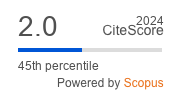Join the 2026 CIJ Summer School on experimentation-driven research methodologies at CERN IdeaSquare in Geneva (8–12 June 2026)
Applications are now open!
This tuition-free program offers hands-on, interdisciplinary training combining lectures, workshops, roundtaUniversitysions, and an on-site experiment. Don't miss this unique chance to learn from leading experts of experimental research methods.
Early bird application deadline: 15 February
Final deadline: 15 March
Full details and application instructions are available on the event page: https://indico.cern.ch/event/1622011/

